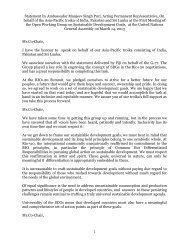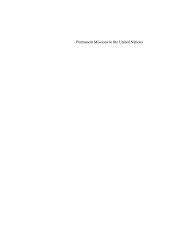Statement by Ambassador Sujata Mehta, Permanent Representative ...
Statement by Ambassador Sujata Mehta, Permanent Representative ...
Statement by Ambassador Sujata Mehta, Permanent Representative ...
You also want an ePaper? Increase the reach of your titles
YUMPU automatically turns print PDFs into web optimized ePapers that Google loves.
<strong>Statement</strong> <strong>by</strong> <strong>Ambassador</strong> <strong>Sujata</strong> <strong>Mehta</strong>, <strong>Permanent</strong> <strong>Representative</strong> of<br />
India to the Conference on Disarmament at the 2013 Substantive Session of<br />
United Nations Disarmament Commission, New York on April 1, 2013<br />
Mr. Chairman,<br />
Please accept our felicitations on your election as Chairman of this year’s UNDC<br />
meetings. I would also like to congratulate other members of the bureau on their<br />
elections. Let me assure you of the full support of my delegation in the discharge of your<br />
responsibilities. I would also like to place on record our appreciation for the work done<br />
<strong>by</strong> the UNDC Chair of last year as also the Chairs of the two Working Groups.<br />
India associates itself with the statement made <strong>by</strong> Indonesia on behalf of the<br />
Non-Aligned Movement.<br />
Mr. Chairman,<br />
India attaches high importance to the UNDC which is the deliberative leg of the<br />
triad of disarmament machinery put in place <strong>by</strong> the First Special Session of General<br />
Assembly on Disarmament. The Commission plays a unique role as the only body with<br />
universal membership for in-depth deliberations on relevant disarmament issues. We<br />
cannot over emphasise the role of this body at a time when both the disarmament<br />
agenda and the disarmament machinery face numerous challenges.<br />
The UNDC offers an opportunity for Member States to collectively make progress<br />
on important disarmament issues <strong>by</strong> infusing coherence and consensus in disarmament<br />
debate which is extremely important if we are to address security challenges of our<br />
times. While we share the disappointment at the UNDC not being able to adopt<br />
substantive recommendations for more than a decade, we continue to have belief in the<br />
inherent value of this forum. It is up to us Member States to realise the value of UNDC<br />
<strong>by</strong> giving importance to its work and showing greater political commitment on<br />
disarmament issues.<br />
Mr. Chairman,<br />
The General Assembly in its resolution 52/492 of 1998 had decided that nuclear<br />
disarmament will constitute one of the agenda items of UNDC every year. However, it<br />
was only after considerable deliberations last year that the Commission was able to<br />
adopt its agenda for the 2012-14 cycle of its meetings, with nuclear disarmament as one
of the agenda items. Nonetheless, we now have two agenda items for this cycle on which<br />
a large measure of ground has already been covered in previous years. We believe that<br />
elements on which substantial agreement was reached among Member States in the past<br />
should be preserved.<br />
At this stage, we would like to share some thoughts on the two issues on our<br />
agenda. We will further elaborate our positions in the meetings of the two Working<br />
Groups in the coming three weeks. We attach high importance to the agenda item<br />
“Recommendations for achieving the objective of nuclear disarmament and<br />
non-proliferation of nuclear weapons”. The complete elimination of nuclear weapons is<br />
a long cherished goal of the international community. The UN General Assembly in its<br />
very first resolution, adopted unanimously in 1946, sought the elimination from<br />
national armaments of atomic weapons and all other major weapons adaptable to mass<br />
destruction. The final document of SSOD-I adopted <strong>by</strong> consensus <strong>by</strong> the international<br />
community, also accorded the highest priority to nuclear disarmament.<br />
India attaches the highest priority to global, non-discriminatory verifiable<br />
nuclear disarmament, a principle which has strong and consistent domestic support in<br />
our country. India is convinced that the goal of nuclear disarmament can be achieved<br />
through a step-<strong>by</strong>-step process underwritten <strong>by</strong> a universal commitment and an agreed<br />
multilateral framework that is global and non-discriminatory. There is need for a<br />
meaningful dialogue among all states possessing nuclear weapons to build trust and<br />
confidence and for reducing the salience of nuclear weapons in international affairs and<br />
security doctrines.<br />
In the current international climate there is greater support for progressive steps<br />
for delegitimization of nuclear weapons. Measures to reduce nuclear danger arising<br />
from accidental or unauthorised use of nuclear weapons are pertinent in this regard.<br />
India’s resolutions in the First Committee give expression to some of these ideas and<br />
have found support from a large number of States. Our Working Paper tabled in the<br />
UNDC in April 2007, which was developed in the spirit of the 1988 Rajiv Gandhi Action<br />
Plan, also suggested specific measures, including a Global No First Use Agreement and a<br />
Convention on the Prohibition of the Use of Nuclear Weapons.<br />
We believe that the UNDC must send a strong signal of the international<br />
community’s resolve for achieving the goal of global, non-discriminatory and verifiable<br />
nuclear disarmament. Member States should use this forum to intensify dialogue in this<br />
regard. We can demonstrate our commitment <strong>by</strong> adopting consensus recommendations<br />
on the objective of nuclear disarmament and non-proliferation of nuclear weapons.<br />
As regards the second agenda item “Practical CBMs in the field of conventional
weapons”, let me state that India supports practical CBMs initiatives whether unilateral,<br />
bilateral, regional or global. We believe that CBMs can build trust and confidence and<br />
enhance transparency to minimize misunderstandings and misperceptions there<strong>by</strong><br />
promoting a suitable environment of peace and security among States. India has<br />
initiated several CBMs with the countries in our neighbourhood.<br />
We believe that the initiation of a confidence building process must be decided<br />
upon <strong>by</strong> States freely and in the exercise of their sovereignty. Confidence building must<br />
be a step-<strong>by</strong>-step process and should evolve at a pace comfortable to all participating<br />
states. CBMs in specific regions should fully take into account the political, military and<br />
other conditions prevailing in the region. CBMs in a regional context should be adopted<br />
on the initiation and with the agreement of the States of the region concerned. In<br />
elaborating practical CBMs in the filed of conventional weapons, we should take<br />
advantage of the guidelines on CBMs endorsed <strong>by</strong> the UNGA at its 41st session on the<br />
recommendation of the UNDC.<br />
We believe that significant amount of work needs to be accomplished on this<br />
agenda item in our meetings this year and the next. The discussions last year were<br />
sketchy perhaps in anticipation of the results of the ATT negotiations as well as the<br />
Review Conference of the UNPOA on SALW. We also believe that discussions on CBMs<br />
in the field of conventional weapons should not become a tool for pursuing political<br />
agendas or for promoting instruments that do not enjoy universal support.<br />
Mr. Chairman,<br />
Being the second year of this cycle of UNDC meetings, this year is crucial for us to<br />
be able to adopt substantive recommendations at the conclusion of the cycle next year.<br />
Since we have only two items on our agenda, unlike three in the past cycle, there is a<br />
possibility for in-depth exchange of views on all aspects related to these agenda items<br />
this year. We are therefore hopeful of good progress in our work.<br />
Thank you.<br />
BACK TO TABLE OF CONTENTS



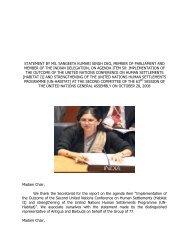
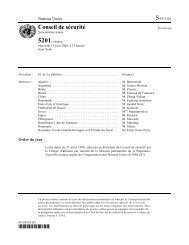
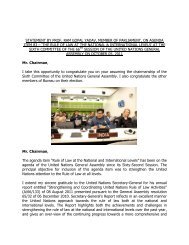
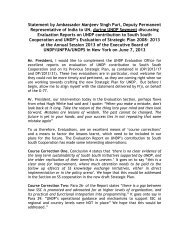
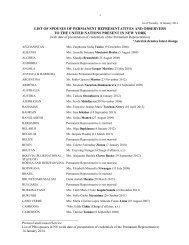
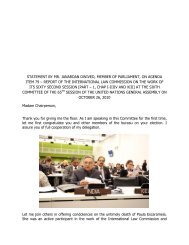
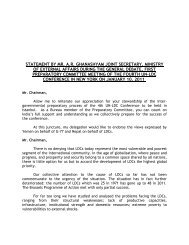
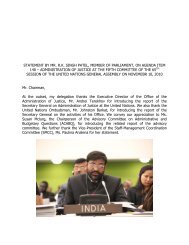
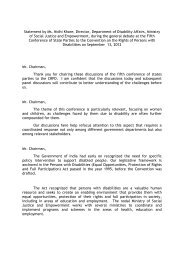
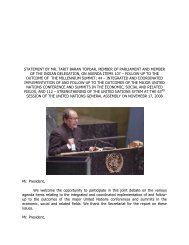
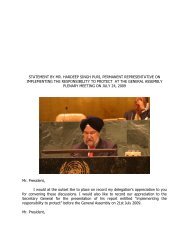
![1 statement by dr.[mrs] kakoli ghosh dastidar - Member States Portal](https://img.yumpu.com/27526598/1/190x245/1-statement-by-drmrs-kakoli-ghosh-dastidar-member-states-portal.jpg?quality=85)
